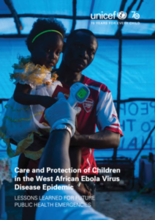Displaying 61 - 70 of 302
This document is an evaluation of Retrak’s reintegration of street children and community-based child protection project in SNNPR, Ethiopia.
According to this article from Forced Migration Review, when the majority of aid comes from external sources, it can cause those who receive the aid to feel powerless.
In this Ethiopia Child Protection Fact Sheet, UNHCR provides the main child protection highlights, issues, and trends for 2014 to 2016.
This report examines three Ebola-affected countries – Liberia, Sierra Leone, and Guinea – to analyse the degree to which the response was successful in addressing the scale and unique nature of the child protection situation that arose due to the epidemic.
This briefing is based on a rapid review of the available literature on outreach work with children and young people. It is intended to provide the ReachOut project with an overview of different approaches to outreach; what it generally aims to achieve; what distinguishes it from centre-based work and how it is applicable to children and young people involved in, or at risk of, child sexual exploitation.
Strong Beginnings (SB) was an 18-month project purposed to promote an alternative care model that places emphasis on family based care of children, improving the quality of care within child care institutions, build capacities of government and non-government agencies in implementing alternative care; generate evidence and promote learning.
This study examines the experiences of young female survivors of sexual violence in northern Uganda in order to explore the variety of roles (both positive and negative) that informal support networks played in contributing to survivors’ healing, recovery, and reintegration.
This paper discusses a large evaluation study that attempts to describe the impacts of the alcohol control laws enacted in various indigenous communities. Participants were interviewed and asked to give their thoughts on how the laws have affected them medically, economically and socially.
The purpose of this report is to review the current conditions of the global social workforce. This study is meant to identify critical gaps in order prioritize current workforce strengthening research.
This study investigates the effects of Community Care Coalitions on child protection in Assosa City, Ethiopia. It explores services and strategies employed by Community Care Coalitions to address child protection, as well as challenges faced by Community Care Coalitions while attempting to provide these services.







